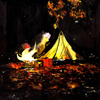James Blackshaw, "Love is the Plan, the Plan is Death"

As much as I've always enjoyed Blackshaw's work, solo acoustic guitar albums have never quite been my favorite thing and I always wished he would record something else as ambitious and divergent as The Glass Bead's Game's "Cross" (or "Arc," for that matter).  However, James' recent nylon string compositions have caused me to stop thinking that.  Love is the Plan builds upon the promise of the similar Holly, but completely and dazzlingly eclipses it, striking the perfect balance between  blur-fingered virtuosity and poignant melody.  This is easily Blackshaw's best album to date.
I must confess that I did not fall instantly in love with this album–in fact, I initially found it exasperating for a number of disparate reasons.  The main one was that it essentially sounds like Holly II with a couple of digressions added to pad it out.  I also thought that some of the nylon string pieces had some overly polite/pastoral stretches and that the two piano pieces were a bit baffling and aesthetically chameleonic.  For example, "And I Have Come Upon This Place By Lost Ways" is a very unusual piece featuring vocals from Menace Ruine's Genevieve Beaulieu that sounds like Blackshaw may have overstretched his ambitions into a disorienting stylistic no-man's land that is equal parts jazz-via-Gershwin, torch song, medieval ballad, and spiritual.  Then, the admittedly beautiful closer ("The Snows are Melted, the Snows are Gone") goes an entirely different direction, opting for Romantic and melancholy Satie-esque simplicity.  I suppose they share the theme of bittersweet sadness, but I was disappointed at how straightforward James' piano playing was, given how adventurous he had been with "Arc" just a few short years ago.  Curiously, I still think all of the above are perfectly valid observations, but they are all superficial and became largely insignificant once I was fully immersed in the album.
Blackshaw devotes four of the six songs to lengthy, intricate, and churning cascades of finger-picked nylon string arpeggios, so they are basically the meat of the album.  James' playing has evolved enormously since the Holly EP though, almost to a Faustian, met-the-devil-at-the-crossroads degree.  Pieces like "We Who Stole the Dream" are quite simply on an entirely different level of depth, complexity, intensity, and emotion than I was expecting.  As I listened to Love is the Plan more and more, I began to realize that almost every song on the album boasted at least one incredibly poignant or beautiful hook that I loved.  That epiphany, though seemingly minor, completely changed how I listened to the album–instead of focusing on thoughts like "ugh-I wish that piano part wasn't there," I found myself happily anticipating the point in each song when it would cohere into an especially wonderful motif. Consequently, I gradually came to understand and appreciate how masterfully Blackshaw transitioned from theme to theme, endlessly building and releasing tension without ever losing momentum and urgency.  It just took some time and focused attention for me to reach that point.
Of course, I still have absolutely no idea what to make of the piano pieces, but that isn't necessarily a bad thing.  Both certainly have their merits–in fact, I actually enjoyed being totally wrong-footed by Beaulieu's enigmatic, atemporal contribution.  More importantly, Love is the Plan needs those two piano pieces to be there–James knew exactly what he was doing.  Without them, the sequencing simply would not work and the guitar pieces would blur together and be denied their full impact.  Similarly, the album's flaws seem just as necessary, as the imperfections and odd digressions are both humanizing and endearing.  I can't stress enough how pleasantly surprised I am–everything I want in an album is here: vibrancy, ambition, daring, great songwriting, and intimacy (every scrape and creak is audible, as is Blackshaw's breathing).  I don't see how Blackshaw (or anyone else) could possibly surpass his nylon string playing here, both composition-wise and for sheer dexterousness.  It must have taken an enormous amount of willpower for James to not spike his guitar on the floor and proclaim "Top that, suckers.  I'm retiring." when the final note was recorded.  This is great.
 



